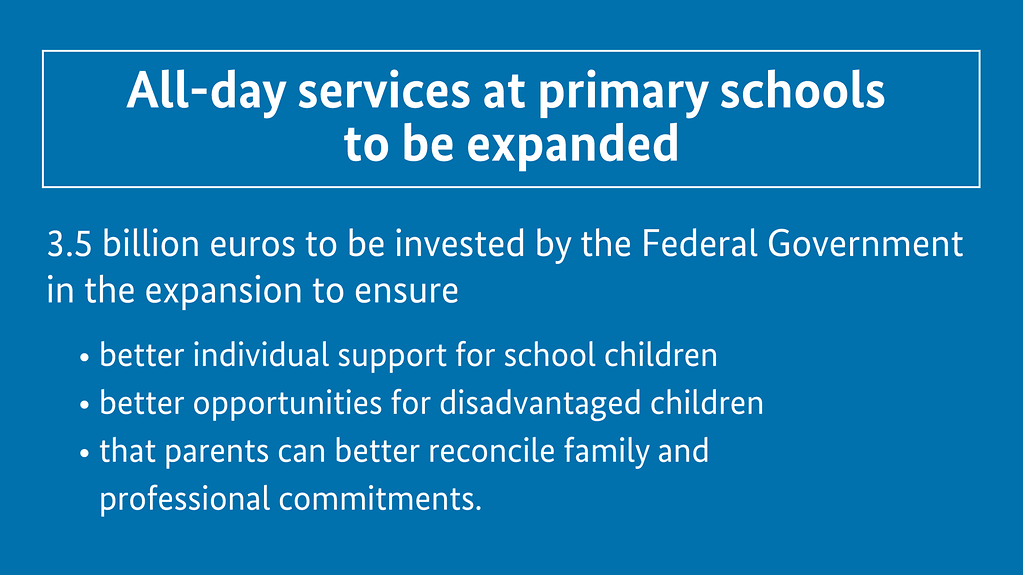FAQs to expanding all-day services at primary schools
The German Federal Government is driving forward the expansion of all-day care in primary schools. As of the academic year 2026/2027, step by step, every primary school child is to gain a legal entitlement to all-day care, the Cabinet has decided.
3 min reading time

More quality daycare options are needed for primary school children – in the afternoons too.
Against a blue background the diagram is headed “All-day services at primary schools to be expanded”. This is followed by:
3.5 billion euros to be invested by the Federal Government in the expansion to ensure
- better individual support for school children
- better opportunities for disadvantaged children
- that parents can better reconcile family and professional commitments.
As of 2026 there is to be a legal entitlement to all-day care for primary school children.
Photo: Bundesregierung
What exactly does the German Federal Government plan in terms of all-day care?
The Federal Government has launched a legal entitlement to all-day care for primary children as of 2026. This translates into practice an important project set out in the coalition agreement. The legal entitlement is to come into effect on 1 August 2026.
It will initially apply to children in Grade 1 and will gradually be expanded year by year. As of 1 August 2029, every primary school child (Grades 1 to 4) will be entitled to all-day care, i.e. eight hours a day, five days a week. The actual teaching time will be deducted from this. There will not, of course, be any obligation to accept the offer of all-day care.
How will the expansion of all-day care be financed?
All in all, the Federal Government is providing a sum of up to 3.5 billion euros to the Länder to enable them to expand the range of all-day care at primary schools. The Federal Government had originally earmarked 2 billion euros for the Länder to be used to roll out reliable, needs-driven education and daycare services. When the recovery package to address the impacts of the COVID-19 pandemic was being put together, the Federal Government decided at short notice to raise this sum by an additional 1.5 billion euros.
Moreover, the Federal Government is to shoulder some of the additional running costs of the Länder, by modifying the way turnover tax is split such that the Länder receive a larger share.
How great is the demand for all-day care in Germany?
About half of all primary school children already use all-day care services. Federal Minister for Family Affairs Franziska Giffey, however, believes that demand is very much higher, and puts it at 75 to 80 per cent. This gap is now to be closed. According to Franziska Giffey, the importance of afternoon daycare services has become particularly clear during the pandemic. The German Federal Government’s commitment to all-day services is to make it easier for parents to reconcile professional and family responsibilities.
Why is it important to expand all-day care?
Expanding all-day care at primary school level is an important concern of the German Federal Government. Daycare services outside actual teaching time not only make it easier for parents to balance family and professional commitments. The primary school children also benefit from a reliable all-day system. Their social, emotional and physical development is fostered. And individual support can be offered even outside teaching time. That helps enhance the opportunities open to children from socially disadvantaged families.
Why is the German Federal Government doing so much in the field of child daycare?
For many years, the Federal Government has seen smoothly functioning daycare for children as an important concern. The COVID-19 pandemic in particular has underscored the importance of investing in reliable daycare for children.
In 2007 the Federal and Länder Governments agreed to increase the number of places available in daycare for under three-year-olds and to introduce a legal entitlement to a place in daycare for this age group as of 2013. Since then, several investment programmes have been launched to finance daycare for children. Between 2008 and 2020 the Federal Government invested some 4.4 billion euros in increasing the number of places in daycare, creating and securing more than 780,000 new places – and the expansion programme is not yet completed.
The transition from nursery level daycare to primary schools is still a challenge for many families though. The demand for all-day services for primary-age children cannot yet be met. When children reach school age, they are no longer entitled to a place in daycare although the school day often ends at lunchtime. This is why more quality daycare options are needed for primary school children – in the afternoons too.